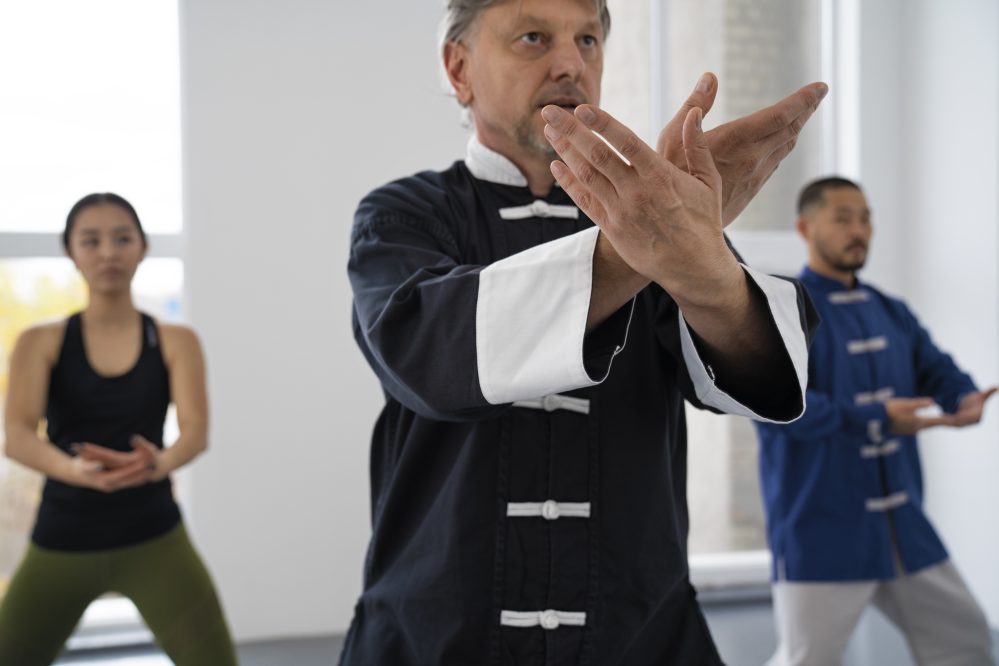With its roots in Chinese medicine, qigong is the practice of controlling one’s breath and movements to optimize one’s well-being. This age-old practice has earned recognition for its capability to revitalize health and internal peace within the body. This article will discuss qigong’s fundamentals, including its types, benefits, and potential side effects. Keep on reading to discover more about how qigong can help you!
What Is Qigong?
Qigong, roughly translated to “the master of one’s energy,” is a popular treatment in traditional Chinese medicine (TCM). The idea of qigong comes from the Chinese theory of “qi,” meaning energy. According to TCM, for a human to feel their best, the energy must flow naturally across all body meridians, thus improving one’s well-being. As a relaxing technique, similar to meditation, qigong revolves around three essential components: body, mind, and spirit. It integrates specific breathing, movement, and mind exercises to improve a person’s physical and mental health.
Types of Qigong Practices
Although heavy in numbers, qigong styles are divided into three groups: medical, martial, and spiritual. We will now elaborate on each type.
Medical Qigong
This type of qigong is the most prominent and is available to assist in many health conditions. As the term suggests, medical qigong is applied for medical purposes, aiming to treat serious illnesses and conditions.
Medical qigong is administered under the supervision of a trained professional. This technique is also effective in recognizing the root causes of disease symptoms, simplifying the body’s healing process.
Notwithstanding its importance, medical qigong is not designed to be a standalone treatment. It serves as a complementary technique alongside conventional medicine to help patients recover.
With medical qigong, each person’s experience is unique. While relief may manifest quickly for some, it could take longer for others.
Martial Qigong
Martial qigong is a specialized branch of qigong catered toward improving martial skills. This type of qigong includes a series of exercises, meditation practices, and breathing techniques to enhance skills like mental focus, precision, balance, flexibility, speed, and strength.
Another benefit of this style is that it increases the power and efficiency of muscles. Practitioners employ martial qigong to channel their “qi” to energize their muscles and enhance efficiency.
By aiding practitioners in achieving the highest form of ability and mindfulness in their practice, martial qigong can also be a valuable asset to martial arts training.
Spiritual Qigong
Contrary to medical and martial qigong, which aim to enhance an individual’s physical health or martial prowess, the primary focus of spiritual qigong is inner peace and well-being.
Through a range of spiritual practices and exercises, this branch of qigong assists individuals in building a more profound connection with their surroundings and the world around them. In other words, individuals harness the power of energy flow to quiet the mind and become more self-aware. It enables them to interact with their thoughts and emotions.
To discover its full potential, individuals are encouraged to practice spiritual qigong with an open heart.
How Qigong Enhances Your Health and Well-Being

From physical improvements to enhanced well-being, here is how qigong can help you:
Physical Health
Qigong contributes to a healthier and more resilient body. Incorporating deliberate movements and breathing exercises during qigong encourages better body awareness. Qigong leads to improved blood circulation, which, in turn, reduces the risk of hypertension – a significant risk factor for heart disease – and enhances cardiovascular health. Other benefits of qigong include pain management, body flexibility and balance, and improved immune function.
Improved Balance and Flexibility
Qigong improves balance and flexibility because it helps the individual become more in tune with the body, enhancing greater control over its movements. This becomes easily manageable through exercises, including flowy movements and deep stretches. As a result, qigong can reduce the likelihood of falls and improve stability, which is beneficial, especially for the elders. Enhanced balance and flexibility also reduce the risk of injury in everyday activities.
Pain Management
Qigong is recognized as a holistic approach to pain relief. By promoting relaxation and removing tension in the body through the circulation of “qi,” individuals learn to manage pain, such as that associated with fibromyalgia, Parkinson’s disease, or chronic heart failure. To those dealing with chronic discomfort, qigong serves as an alternative approach to medication and other procedures for alleviating pain.
Enhanced Immune Function
Strengthening the immune system is another significant benefit to practicing qigong. Studies have shown that this technique positively impacts the immune system and its response to inflammation. This is done in two ways. Qigong enhances your immune system by promoting the circulation of body fluids, like lymph, blood, and synovial, and by reducing chronic stress, which otherwise weakens the immune system.
Mental Health and Well-Being
Qigong’s holistic approach addresses the interplay between the mind, body, and spirit, making it a powerful tool for improving mental health and overall well-being. More specifically, qigong aids in reducing stress, promoting emotional balance, ensuring mental clarity, and enabling energy cultivation and inner peace.
Stress Reduction
Supported by its breathing techniques, qigong is an excellent source for reducing stress. Much like meditation, qigong helps release mental tension and ease the mind. In this regard, qigong minimizes the impact of stress on the nervous system, leading to an improved sense of calmness and well-being.
Emotional Balance
Emotional balance is one’s ability to remain calm and collected under high-pressure situations. As such, qigong aids individuals in gaining a better understanding of their mindfulness, which enables them to manage their emotions more efficiently.
Mental Clarity
Through its meditative aspects, qigong fosters mental clarity. As they practice qigong, individuals get rid of the mental clutter, thus improving their sense of focus and concentration. One’s ability to achieve mental clarity is precious as it allows for better decision-making and problem-solving.
Energy Cultivation & Inner Peace
As noted above, the central aspect of qigong is the energy flow, or “qi.” Harnessing and harmonizing the power of energy to attain inner peace is what makes qigong significantly beneficial. By increasing their energy levels, admirers of qigong gain a profound sense of self, which leads to a peaceful state of mind.
How to Practice Qigong?

In essence, anyone can practice qigong at home (indoors or outdoors), except for medical qigong, which has to be supervised by a professional. The critical goal when practicing this Chinese treatment is to harmonize the flow of “qi” within the body. To achieve this effect, the practitioner applies a variety of exercises. Good qigong practice uses body, breath, and mind intent.
To firmly practice qigong, you are required to take deep breaths in and out in an attempt to regulate your breathing. This will serve as the foundation for further exercises because, at this stage, the individual is calm and has complete control over their movements.
Slowly, you will start performing a series of deliberate movements and postures using arms, legs, and, essentially, your whole body. These have to be executed with focused awareness. As you experiment with options, you can either choose to practice qigong in a sitting or standing posture or alternate between the two.
By mastering body, breath, and mind techniques, you will start noticing an improvement in your energy balance, emotional well-being, and overall physical health. Remember that the results are not instantaneous. You can expect excellent outcomes only if you’re patient.
Precautions and Considerations
Generally, qigong is deemed a safe activity for individuals of various ages and health conditions. However, this kind of intervention is not entirely risk-free. Individuals need to assess their conditions before starting qigong because practicing the wrong exercises can exacerbate their condition.
Health and Physical Limitations
If you’re thinking of starting qigong, here is what you need to know:
- Mobility issues: People with physical difficulties should limit their posture to only sitting. This way, they focus only on the upper part of the body without risking an injury.
- Balance and stability: Individuals with a history of problems with their balance should practice qigong while being supported by a chair or wall. This removes the risk of falling.
- Pregnancy dilemma: Although limited, data shows that, if done carefully, qigong doesn’t affect pregnancy. Pregnant people are expected to modify their physical movements to ensure a safe process.
- Chronic health: Those diagnosed with various chronic health conditions, such as heart disease, arthritis, or diabetes, should avoid specific movements to benefit from qigong and recover.
Practicing qigong successfully takes time and effort. This process can be self-taught, or a professional can train you. Either way, an important aspect to remember is being aware of your existing health conditions and your aim. Informing your healthcare provider before starting qigong and receiving their approval is vital to well-informed decisions and an effective process.
Potential Side Effects
Qigong’s side effects are minimal. Those who practice qigong have reported dizziness, muscle soreness or pain, and palpitation as the main adverse effects. These are caused by the increased physical movements and breathing techniques during the process.
Conclusion
As a holistic approach to combating health issues, qigong is recognized as highly effective in regulating the body and mind. Its benefits are significantly valuable to those suffering from various conditions. Although qigong is a very inclusive technique, one should consider its limitations and minimal side effects. Remember to reflect on your condition, patience, and time available to determine whether qigong is for you.